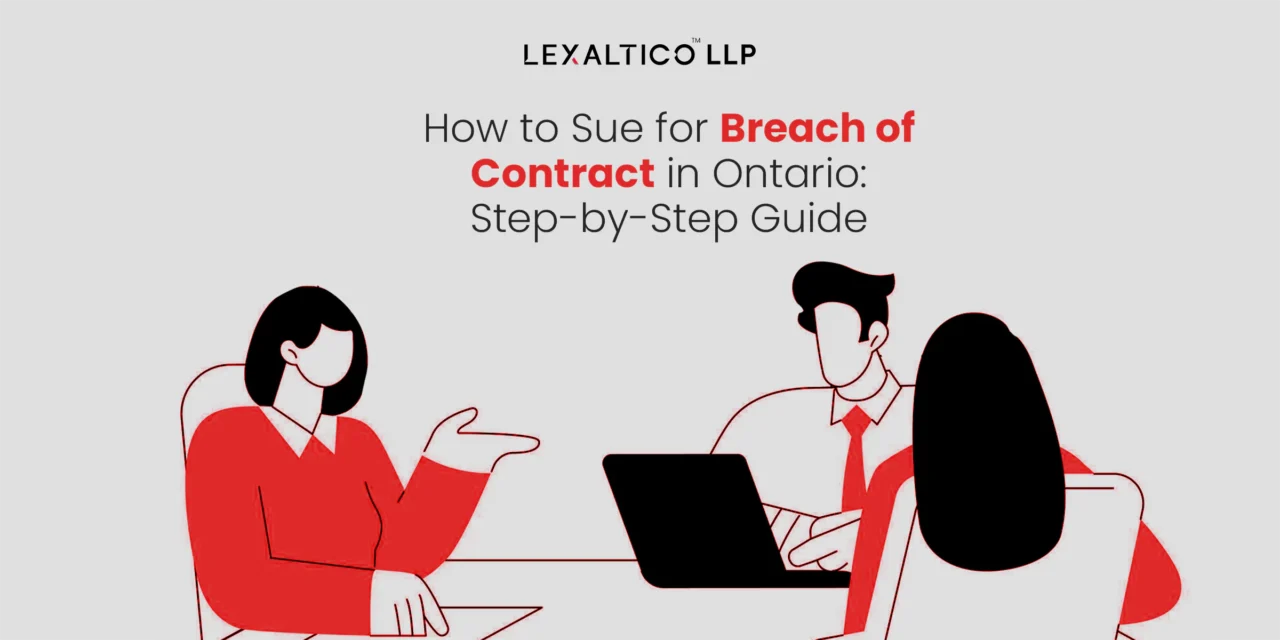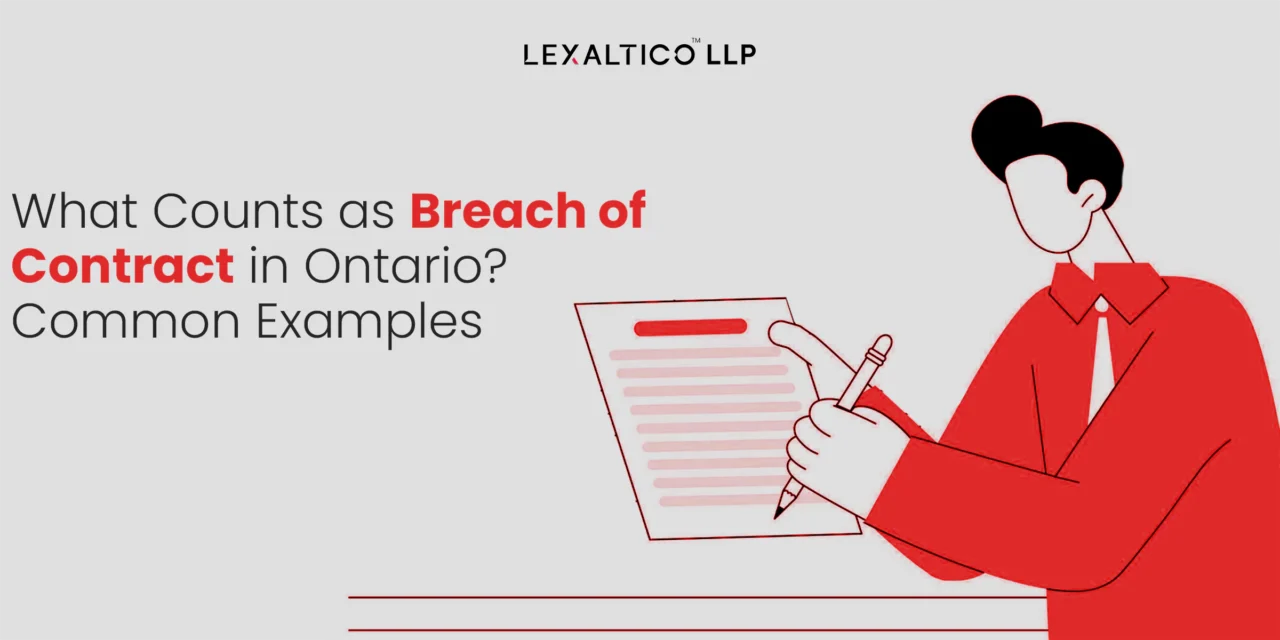Contracts are part of our everyday lives. Whether you are signing a lease, hiring a contractor, or starting a business deal, contracts help protect both sides. But what happens when one party fails to meet their promises?
That’s called a breach of contract.
In this blog, we’ll explain what a breach of contract in Ontario means.
What Is Breach of Contract?
A breach of contract happens when one person or company does not do what they promised in a legal agreement. In Ontario, a contract can be written or oral, but it must include certain terms to be enforceable. These terms are called contractual obligations.
If someone breaks those obligations, it’s called a contract violation. The other party may suffer financial or personal losses because of it. This can lead to a contract dispute or even civil litigation in court.
4 Key Types of Contract Breach in Ontario Explained
Not every broken promise is treated the same. There are different types of breach of contract, depending on how serious the violation is. In Ontario, the main types include:
1. Minor Breach
This happens when one part of the contract is not followed, but the rest is done. For example, if a builder finishes a project late but still meets all quality standards, that’s a minor breach.
2. Material Breach of Contract
A material breach is more serious. It affects the whole purpose of the contract. If a company fails to deliver important services listed in the deal, it may be a material breach of contract.
3. Fundamental Breach (Ontario)
This is when one party fails so badly that the other party can cancel the contract completely. For example, if a contractor abandons a job halfway through, it could be a fundamental breach in Ontario.
4. Anticipatory Breach
An anticipatory breach happens when one party shows, before the due date, that they don’t plan to follow the contract. This can be done through words or actions.
Ontario Breach of Contract Examples: From Leases to Construction
Here are some examples of breach of contract you might see in Ontario:
1. Failure to Deliver Goods or Services
If a seller does not deliver products as promised, it can lead to contract enforcement. For instance, if you pay a vendor and they don’t ship the items, that’s a breach of agreement.
2. Not Paying on Time
If one party fails to make payments on time, that can be a material breach, especially if payment was a key term in the deal.
3. Breaking Terms of a Lease
A tenant who sublets a property without permission, or a landlord who doesn’t fix essential services, may be guilty of contract violation in Ontario.
4. Contractor Abandoning Work
If you hire a contractor and they stop the work halfway through without a good reason, that is often a fundamental breach.
5. Job Offer Withdrawn After Acceptance
If an employer gives a job offer in writing, and the employee accepts it, pulling it back without a reason could be a breach of contract Ontario.
Is an Oral Contract Enforceable in Ontario?
Oral contracts can be legal in Ontario. But they are harder to prove. It’s always better to have a written agreement, so both sides understand their contractual obligations. Written contracts help with contract enforcement in Ontario.
How to Sue for Breach of Contract in Ontario: Step-by-Step Guide

If someone breaches a contract, you have the right to take legal action. Here’s how to sue for breach of contract in Ontario:
1. Review the Contract
First, check the agreement clauses. Look at the details of what each party agreed to do. See if the breach is a material vs minor breach.
2. Try to Settle the Dispute
Before going to court, you can try to solve the issue through mediation or a simple negotiation. This is often cheaper and faster.
3. Hire a Civil Litigation Lawyer in Ontario
If you can’t resolve the issue, you may need a civil litigation lawyer in Ontario. They can help you understand your rights and file a legal claim.
4. File a Claim
You can file your case in the Small Claims Court (up to $35,000) or in the Superior Court if the amount is higher. Your lawyer will help you gather evidence and build your case.
Legal Remedies for Breach of Contract in Ontario: Damages, Specific Performance & More
Ontario law offers several legal remedies for breach of contract, depending on the type of breach and the losses caused.
1. Damages for Breach
This is the most common remedy. It means the person who broke the contract pays money to the other party. This can include loss of expectation, like profits you would have made.
2. Specific Performance
In some cases, the court may order the breaching party to do what they promised. This is called specific performance. It often applies in real estate contracts, where money cannot replace the exact thing.
3. Contract Termination
If the breach is very serious (like a fundamental breach), the court may allow you to end the contract early.
4. Repudiation
If one party shows they no longer want to follow the contract, that’s called repudiation. The other party can treat the contract as over and claim damages.
Duty to Mitigate in Ontario Contract Law: What You Must Know
In Ontario, if someone breaches a contract with you, you must try to reduce your losses. This is called the duty to mitigate.
For example, if a contractor quits, you should try to find another one, rather than waiting and letting the damages grow.
Ontario Contract Law: Statutes That Impact Breach of Contract Cases
Contract law in Ontario is based on common law, which means it comes from court decisions. However, some parts are covered by provincial laws, like the Sale of Goods Act or the Consumer Protection Act.
These laws help decide what counts as a valid and enforceable contract, how to deal with contract disputes, and what remedies are available for a breach of agreement.
Tips to Avoid Contract Disputes in Ontario
Here are a few tips to avoid or deal with a contract dispute in Ontario:
- Always use a written contract: This avoids confusion and helps in court.
- Read every clause: Understand your contractual obligations.
- Keep records: Save emails, texts, and receipts.
- Act quickly: If you notice a breach, take action right away.
- Get legal advice: A lawyer can help you understand your rights and next steps.
Final Thoughts
A breach of contract can cause stress, loss, and confusion. But knowing your rights under Ontario contract law can help you act with confidence. Whether it’s a material breach, an anticipatory breach, or just a minor issue, you have options.
If you’re dealing with a contract violation in Ontario, speak with a civil litigation lawyer Ontario to find the best solution. With the right help, you can protect your interests and seek fair damages for breach.
Quick FAQs
A breach of contract in Ontario happens when one party fails to meet their promises in a valid agreement. This can include not paying, not delivering services, or breaking the terms listed in the contract.
The four main types are minor breach, material breach, fundamental breach, and anticipatory breach. Each type depends on how serious the failure is and how it affects the contract.
Yes, you can sue for breach of an oral contract in Ontario if you can prove the agreement existed and was valid. However, it’s harder to prove in court without written evidence.
Legal remedies include damages (money compensation), specific performance, contract termination, and sometimes rescission of the agreement. The right remedy depends on how serious the breach is.
A material breach is when one party fails to meet a key part of the contract, affecting the whole purpose of the deal. It often gives the other party the right to sue or end the contract.
A fundamental breach is very serious and allows the other party to end the contract and seek damages. A minor breach is less serious and usually does not allow full termination.
Yes, you can terminate a contract in Ontario if the breach is material or fundamental. For minor breaches, the contract usually continues unless otherwise stated.
You must show that there was a valid contract, the other party failed to meet their obligations, and you suffered a loss. Evidence like emails, invoices, and witness statements can help your case.
What happens if both parties breach a contract?
If both parties breach the contract, the court may look at who breached first and how serious each breach was. This can affect the outcome and the amount of damages awarded.
Disclaimer: The information provided in this blog is for general informational purposes only. For professional assistance and advice, please contact experts.



